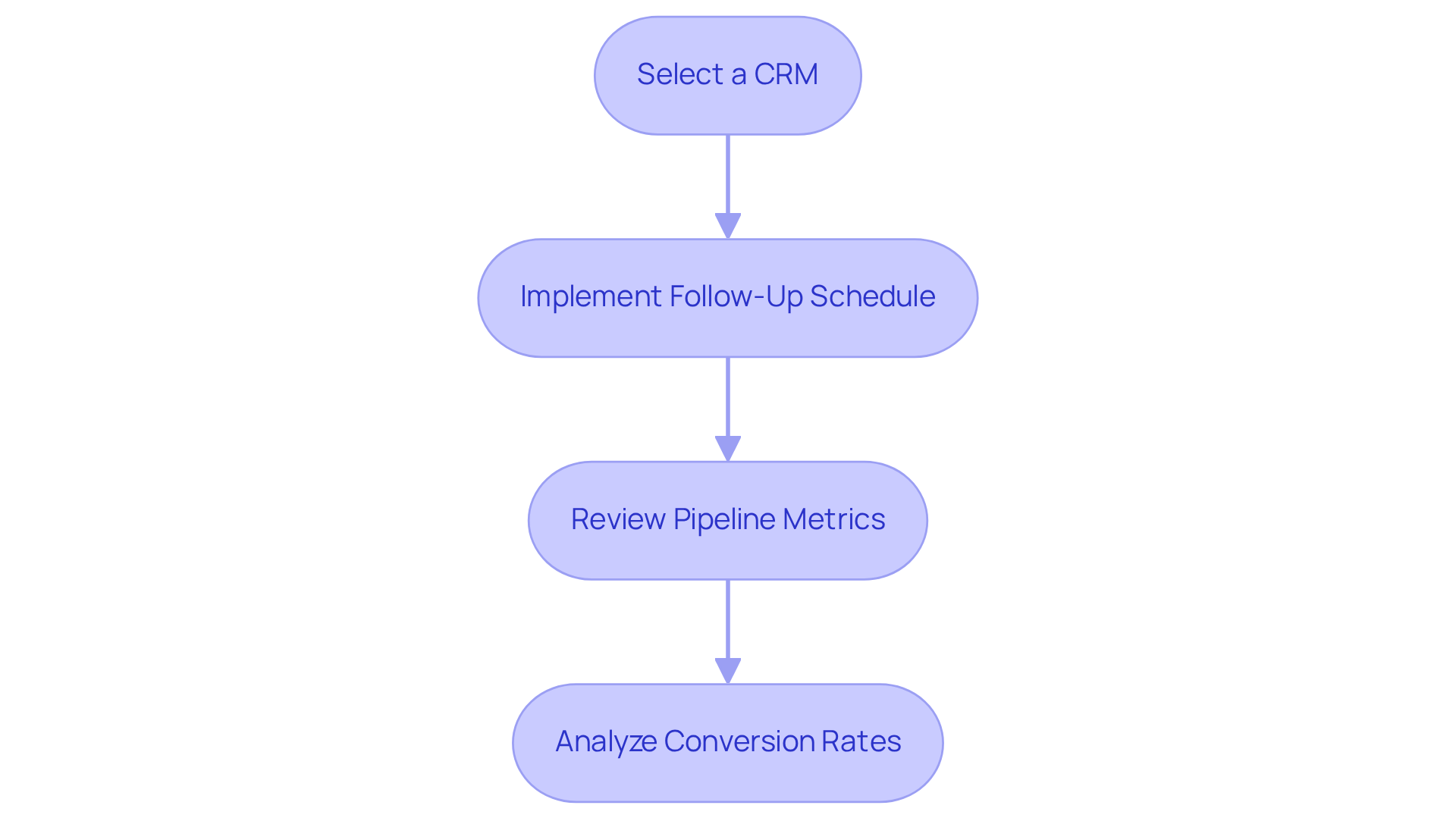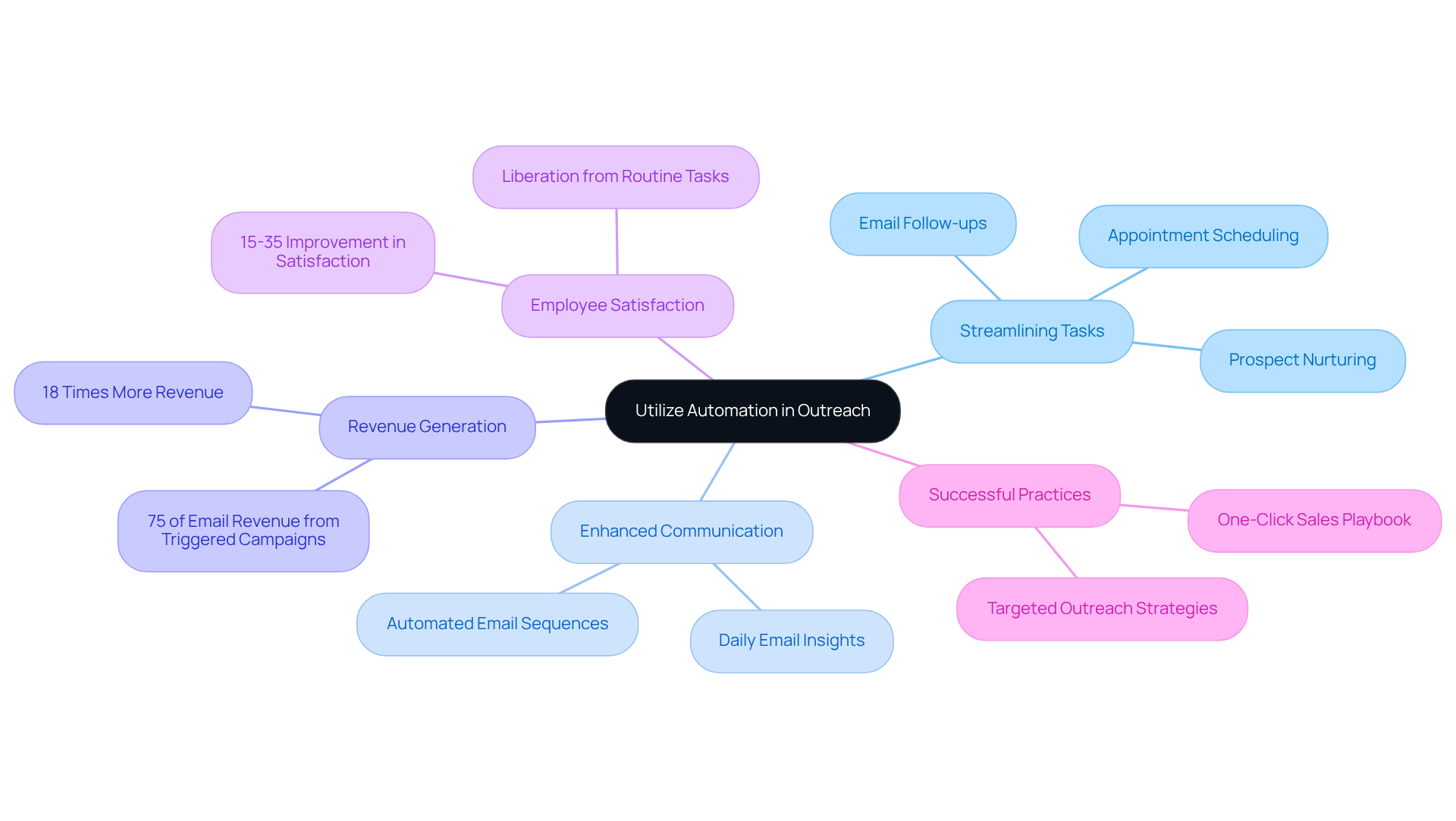Overview
This article highlights the vital role of optimizing a pipeline sales CRM in fostering small business success. By effectively managing the sales process and enhancing client acquisition, small business owners can truly thrive. We understand the challenges you face, and that’s why we’re sharing key strategies that can make a difference.
Consider defining your sales stages clearly. This not only provides structure but also helps you visualize your sales journey. Utilizing automation for outreach can save you precious time, allowing you to focus on building relationships. Regularly analyzing your metrics is crucial; it empowers you to make informed decisions that can lead to improved conversion rates and revenue growth.
Together, these strategies create a powerful approach to sales management. By implementing them, you can enhance your business’s performance and achieve the success you desire. Remember, we’re here to support you on this journey.
Introduction
Navigating the competitive landscape of small business sales can feel overwhelming, especially when it comes to efficiently managing your sales pipeline. A well-structured pipeline sales CRM not only clarifies your journey from lead generation to closing deals, but it also empowers you to streamline processes and enhance revenue. We understand that many business owners grapple with the challenge of optimizing these systems to maximize their effectiveness.
What strategies can we employ together to ensure that every potential client is nurtured and every opportunity is seized? Let's explore this journey with compassion and clarity.
Define the Sales Pipeline: Essential Concepts for Small Businesses
A commercial pipeline sales CRM serves as a visual guide, illustrating the journey a prospective client takes from initial contact to deal completion. For small enterprises, outlining the pipeline sales CRM is crucial, as it involves recognizing key phases:
- Prospect generation
- Qualification
- Proposal
- Negotiation
- Closing
Each phase should have clear standards for progressing contacts, which not only helps monitor advancement but also allows for accurate revenue predictions. By grasping these stages, small business owners can effectively manage their revenue efforts and allocate resources where they are most needed.
Have you considered how categorizing leads based on their readiness to purchase can enable targeted follow-ups? This approach can significantly boost conversion rates. This organized method clarifies the transaction process and empowers teams to focus on high-value activities that drive revenue growth. In fact, organizations utilizing a pipeline sales CRM with a clearly outlined revenue strategy are 33% more likely to finalize agreements, underscoring the importance of this strategic instrument in achieving success for small enterprises.
With , small business owners can optimize client acquisition through features like a one-click sales strategy, simplifying the selling process, and targeted outreach that ensures effective communication with potential clients. Additionally, daily email insights from Wayy.ai monitor leads, interest, and conversion rates, keeping entrepreneurs informed and proactive. This statistic highlights the essential role of organized selling processes in influencing organizational results. Together, we can navigate these challenges and achieve lasting success.
Adopt Effective Strategies: Optimizing Your Sales Pipeline with CRM
To enhance your revenue pipeline, we understand that utilizing a pipeline sales CRM is essential. A CRM empowers small enterprises to effectively monitor interactions with prospects, handle follow-ups, and analyze sales information. Start by selecting a CRM that aligns with your company's unique requirements, focusing on features like prospect tracking, reporting, and automation functionalities. For instance, using CRM templates for follow-ups can save you time and ensure consistency in your communications.
Moreover, regularly reviewing your pipeline metrics—such as conversion rates and average deal size—can help you identify bottlenecks and areas for improvement. Did you know that businesses utilizing CRM for customized prospect nurturing and segmentation can achieve up to a 300% enhancement in conversion rates? Additionally, revenue forecast accuracy can improve by 42% with CRM applications, highlighting the significance of tracking these metrics. Implementing a structured follow-up schedule based on lead behavior can also enhance engagement, ensuring that no potential customer falls through the cracks.
By adopting these strategies, small enterprises can create a more efficient and effective pipeline sales CRM that drives growth. As Michael Scheiner wisely states, "to fully take advantage of CRM’s benefits, concentrate on aspects that improve customer relationships, simplify sales workflows, and enhance team collaboration." With the right , such as automation and analytics, small enterprises can anticipate noticeable improvements in their sales operations, resulting in a stronger client acquisition approach.
It's also essential to recognize common pitfalls; 25% of organizations identify training and user adoption as the biggest challenges in CRM implementation. Ultimately, companies using CRM experience a 29% increase in revenue after integration, making it a powerful tool for driving sales. Together, we can navigate these challenges and achieve success.

Utilize Automation: Streamlining Outreach and Enhancing Efficiency
Automation tools can truly transform outreach efforts for small enterprises, offering a helping hand in streamlining repetitive tasks like email follow-ups, prospect nurturing, and appointment scheduling. Many CRM systems, such as Wayy.ai, come with built-in automation features that make task management a breeze. Imagine implementing automated email sequences for new prospects—this ensures timely communication without the stress of manual intervention. Furthermore, Wayy.ai provides daily email insights that track essential metrics, like how many leads were reached, who showed interest, and the conversion rate. This empowers companies to engage prospects at just the right moment, significantly boosting conversion rates and nurturing deeper connections with potential clients.
Adopting automation not only enhances efficiency but also minimizes the risk of human error, ultimately leading to increased revenue. Did you know that targeted emails generated through automation can yield 18 times more revenue? Additionally, 75% of email revenue comes from triggered personalized email campaigns, showcasing the effectiveness of these strategies in enhancing financial outcomes for small enterprises. Moreover, when employees are liberated from routine tasks through automation, their satisfaction can improve by 15-35%. This highlights the broader positive impact that these tools can have on your team.
By embracing successful automation practices, such as the one-click sales playbook and targeted outreach offered by Wayy.ai, small business owners can optimize their sales processes with a pipeline sales crm and pave the way for sustainable growth. Together, we can and achieve lasting success.

Conclusion
Optimizing a sales pipeline CRM is truly essential for small businesses striving for success in today’s competitive landscape. By clearly defining the stages of the sales pipeline—from prospect generation to closing—small enterprises can effectively manage their revenue efforts and streamline their sales processes. This structured approach not only enhances visibility into the sales journey but also empowers teams to focus on high-value activities that drive growth.
Have you considered how utilizing CRM systems can transform your interactions? Adopting automation to streamline outreach and regularly reviewing pipeline metrics can be game-changers in identifying areas for improvement. Businesses that implement these practices often see a significant boost in conversion rates and enhanced revenue forecasting accuracy, ultimately leading to a more efficient sales process. The statistics shared throughout this article highlight the transformative impact of a well-optimized sales pipeline, underscoring the necessity of adopting effective CRM strategies to maximize your potential.
As you reflect on these insights, remember that small business owners like you are encouraged to leverage the tools available, such as automation and CRM functionalities, to refine your sales processes. By embracing these best practices, you can not only improve your sales outcomes but also foster stronger relationships with your clients. The journey toward optimizing a sales pipeline CRM is a crucial step in achieving sustainable growth and lasting success in today’s dynamic market. Together, we can navigate these challenges and reach new heights.
Frequently Asked Questions
What is a sales pipeline in the context of small businesses?
A sales pipeline is a visual guide that illustrates the journey a prospective client takes from initial contact to deal completion. It helps small businesses understand and manage their sales process.
What are the key phases of a sales pipeline?
The key phases of a sales pipeline include: Prospect generation, Qualification, Proposal, Negotiation, and Closing.
Why is it important to outline the sales pipeline for small businesses?
Outlining the sales pipeline is crucial for recognizing key phases, monitoring advancement, and making accurate revenue predictions, which helps small business owners manage their revenue efforts effectively.
How can categorizing leads based on their readiness to purchase benefit small businesses?
Categorizing leads allows for targeted follow-ups, which can significantly boost conversion rates and clarify the transaction process, enabling teams to focus on high-value activities that drive revenue growth.
What impact does using a pipeline sales CRM have on closing deals?
Organizations utilizing a pipeline sales CRM with a clearly outlined revenue strategy are 33% more likely to finalize agreements, highlighting its importance in achieving success for small enterprises.
How can Wayy.ai assist small business owners in optimizing client acquisition?
Wayy.ai offers features like a one-click sales strategy to simplify the selling process and targeted outreach for effective communication with potential clients, along with daily email insights to monitor leads, interest, and conversion rates.
What role do organized selling processes play in small business success?
Organized selling processes influence organizational results by providing a structured approach to managing sales efforts, ultimately leading to improved performance and success.




